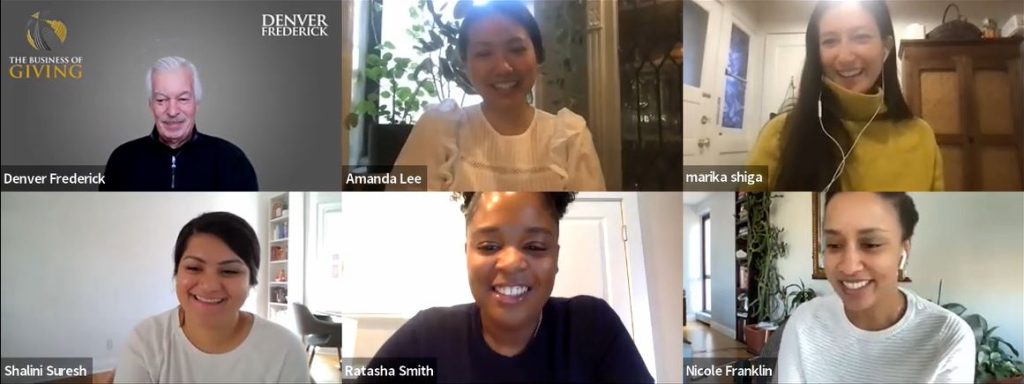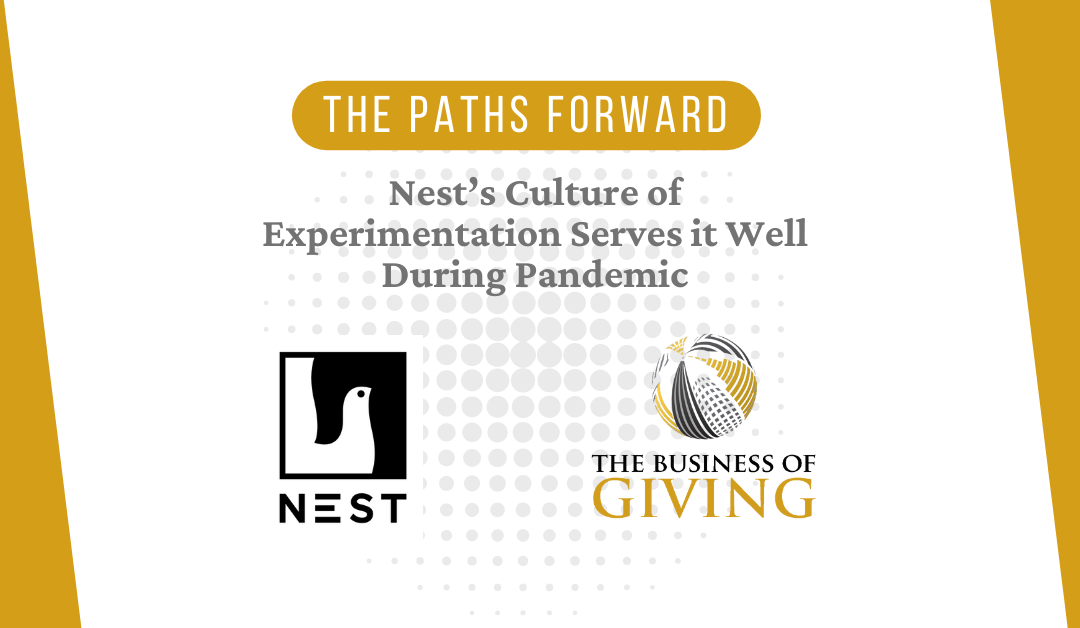Recent events have compelled nonprofit organizations to change the way they get work done, how they deliver their services, and what they do to achieve a more just and equitable society. So, The Business of Giving has connected with those organizations that are doing this exceptionally well in a segment we call: The Paths Forward. Because there is more than just one way.
Denver: In this edition of The Paths Forward we’ll speak with team members at Nest. We’ll begin with their CEO, Rebecca Van Bergen, who will tell us of their mission followed by Shalini who explains how they pivoted to continue to deliver their services during the lockdown.

Rebecca: Our mission as an organization is to help empower the global community of artisan workers. But more than just grassroots impact for each of those businesses, we also want to rethink the way we as consumers, as brands, as anybody, think about the handworker economy and what its potential is for supporting women globally.
Shalini: And that was a very core component of our programming, so we had to act very quickly and really think on our feet and be creative about how we can still continue to deliver impactful programming with that obstacle of not being able to be there in person. And so we mobilized very quickly. We started recruiting local consultants. So we tried to expand how the program is delivered, to train people who are within the same locations where our beneficiaries, our artisans live. And so we trained them remotely. We had to rely on them to really go out into the field and implement our program. And so that was a very big transition, but it was very creative thinking, something that we had to work on really fast. And I think by the end of 2020, we already had people in the field doing our programming, so that was something that really stuck out to me with this transition..
Denver: Intentional Connection is a Hallmark of the Nest Culture as described by Marika, Amanda and Shalini.
Marika: So in the smaller team, it is a little bit easier. So if you had to describe yourself as a color right now, what color would you be and is there anything you want to share around that? Or even just something so simple as changing your name to also add one word around how you’re coming and feeling to this meeting. So definitely bringing more space for people to be a full individual human self while also being an efficient and overachieving Nester, which is definitely also a treat for.
Amanda: Something that I’ve just loved is like really carving out space for fun in our team meetings, which has been a little bit more like recent. And so rather than having like really specific intentional questions, we’re just playing, which I think has in a lot of ways like built a lot of trust, especially for a lot of the new members. It’s like there is that sense of lightheartedness that even though we’re not asking really, tell me about the first time that you did this and I want to know everything about your soul, there is this sense of fun that I think has really brought out a lot of levity in a lot of us, even some of the older members of Nest, and we’ve got to see that. And so I’ve really enjoyed having that opportunity and building that in. And so like we have a committee that does games. I think our holiday party was a ton of games and I never actually grew up in a family that played games, but I love it. And so that just stands out I think a lot to me.
Shalini: I think one thing that stands out to me is also, since we are all remote and we work within specific teams, sometimes I don’t get to talk to Marika at all because our kind of portfolios don’t align. So an initiative that we came up with at the end of last year was introducing cross- team subcommittees. So it was up to us which subcommittees we wanted to join and they tackled overarching organizational goals. And so you get to interact with people that you don’t really interact with on a daily basis.
Denver: Being remote has blurred the lines between work and home like never before. Nicole, Shalini and Ratasha share their thoughts on this.
Nicole: And that struck a chord just because we all have things going on behind the scenes and with our families and our friends and the personal ways we’re dealing with this pandemic, I honestly believe it’s been a collective trauma for a lot of us and it’s changed the ways that our relationships look, and work life and personal life.
Shalini: But when you’re working from home, everything is still there with you. And in addition to seeing people’s backgrounds and seeing their homes, I think sometimes you just can’t separate your personal life from your professional when you’re in that same environment. It’s much more challenging to separate it, and so I think we get exposed to just a wider maybe side of everyone’s lives. And I think it’s something that needs to be intentional as also to let people in, and for some people that comes easy, for some people that’s much harder. So I think that’s something that Nest has really just given us the flexibility to recognizing that there are other things that are going on and giving us the time and space that we need.
Ratasha: But I actually don’t hate being remote in the sense of it gives me a little bit more time to do mom stuff and be here when my son gets home. So I appreciate that. And I appreciate the culture Nest has built digitally where we still communicate and we work with things like that. But I do love these people I’ve got to know over the last couple of months, so I really enjoy that.
Denver: Nicole speaks on being hired virtuaaly, Ratasha shares how Nest supports the team members workspace and Amanda discusses the absence of the post meeting debrief.
Nicole: Yeah, so all video interviews, I think I had three rounds of video interviews, and by that point I was pretty adept at being on camera because as most workplaces went remote in March of 2020. So I had some experience interacting with people in that way, but it doesn’t necessarily account for the nonverbal cues or interactions you have with people when you’re looking at them face to face.
Amanda: Something that I have missed a lot are just like postmeeting debriefs. So I think, Marika, you’re talking about we’re talking as we’re walking, right? So we don’t really have that walking time, whatever that and I think that could be a metaphor for a lot of stuff, because really our meetings are quite stacked up. And sometimes you’re like, now I have all this information and does anybody want to talk about it? And so even if you’re in the office, you’ll have two, three minutes, you’d be like, do you think she meant that? Or do you think he meant that? Or what should we do about that? And so I really missed that because it’s like, all right, come 10:30 sharp, everyone’s signing off and hopping onto the next meeting, and there’s not even like a second.
There has to be like a little bit of a schedule of a debrief, right? Like it doesn’t feel a organic. And I think, yeah, we’d love to see like how and if to build that in, whether it’s like we have 55-minute meetings instead of 60-minute meetings, things like that because we will stop at the 55 mark, like being our team and how we operate. So it could be something like that.
Ratasha: I only knew a couple of people who have literally just moved out of the city. So I’m here by myself for the most part, even when my family has been closer. So these women are the only people I talk to outside of my 10-year-old, so that’s the only social interaction I get all day. But fortunately, Nest has incorporated a stipend for, we can use to make our homes more comfortable. And I think I’m going to start using that stipend to go to WeWork once a week because I’m literally starting to talk to myself more than I think is healthy. So I’ll use to get out of the house. I think I’m going to start using that stipend to go to WeWork once a week and just work around other people and talk to people, and give me something to get dressed for.
Denver: Finally, Nest’s experimental culture has been a real plus according to Amanda and Marika.
Amanda: And so I think a great example of that was like when we all went remote, it was like, okay, here’s a big Excel spreadsheet and let’s all type in what we’re working on for that week. And so we did that for probably less than two weeks and everyone is like, okay, great, this isn’t working, so let’s try something else. And so I think that was a great way to say, let’s try, we’re all leaving two hours, so let’s just try this to see if it works.
Marika: And I do feel that movement, I do think like walking and movement together with brainstorming or ideation or conversation oftentimes results in out-of-the-box ideas or just different perspectives. So totally agree with that sense of movement and the importance of that, or the uniqueness of that.
And actually, one of the partnerships team retreats, we have our own little internal team retreat in the beginning of the year and we did it, I think it was last year so beginning of 2021, we had one session where because so much is on Zoom now, we’re just like, oh, we’re on Zoom, this is great, we can see each other, and I think that is so great. But another thing that we did is we had one session where it was just audio and so people could be cooking or people could be outside walking, and it was really intentional to get people moving and thinking in a space that is different than just like a static space. And so I thought that was something that was cool to think about. As you think about things that we used to do pre-COVID and kind of, okay is there a way to work that into what our life is right now? And definitely Nest being open a space, open to new ideas, and open to try new things, it has been fun to just try out new ways of working together and I’m reliving and thinking all that.
Denver: I want to thank the Nest team members, or Nesters, who participated in this piece: Nicole Franklin, Amanda Lee, Shalini Suresh, Ratasha Smith and Marika Shiga. And to hear more from Nest come to denver-frederick.com and hear my full interview with Rebecca Van Bergen, the Founder and CEO of Nest.
Denver Frederick, Host of The Business of Giving serves as a Strategic Advisor and Executive Coach to NGO and Nonprofit CEOs and Board Chairs. His Book, The Business of Giving: The Non-Profit Leaders Guide to Transform Leadership, Philanthropy, and Organizational Success in a Changed World, will be released in the spring of 2022.
Listen to more The Business of Giving episodes for free here. Subscribe to our podcast channel on Spotify to get notified of new episodes. You can also follow us on Twitter, Instagram, and on Facebook.

